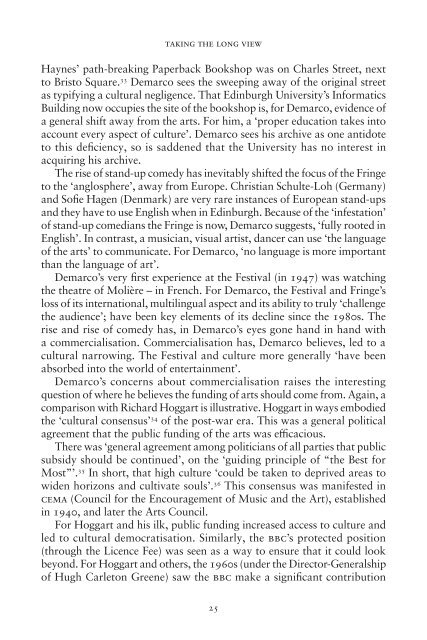Demarco's Edinburgh by Richard Demarco and Roddy Martine sampler
In this fascinating book, Richard – the 2013 UK recipient of the Citizen of Europe medal – explores the original world vision of Sir John Falconer and Rudolph Bing and, with Roddy, recalls the highs and lows of The Edinburgh International Festival, The Fringe, Art, Book, Jazz and Television Festivals, and The Royal Edinburgh Military Tattoo.
In this fascinating book, Richard – the 2013 UK recipient of the Citizen of Europe medal – explores the original world vision of Sir John Falconer and Rudolph Bing and, with Roddy, recalls the highs and lows of The Edinburgh International Festival, The Fringe, Art, Book, Jazz and Television Festivals, and The Royal Edinburgh Military Tattoo.
Create successful ePaper yourself
Turn your PDF publications into a flip-book with our unique Google optimized e-Paper software.
Taking the Long View<br />
Haynes’ path-breaking Paperback Bookshop was on Charles Street, next<br />
to Bristo Square. 33 <strong>Demarco</strong> sees the sweeping away of the original street<br />
as typifying a cultural negligence. That <strong>Edinburgh</strong> University’s Informatics<br />
Building now occupies the site of the bookshop is, for <strong>Demarco</strong>, evidence of<br />
a general shift away from the arts. For him, a ‘proper education takes into<br />
account every aspect of culture’. <strong>Demarco</strong> sees his archive as one antidote<br />
to this deficiency, so is saddened that the University has no interest in<br />
acquiring his archive.<br />
The rise of st<strong>and</strong>-up comedy has inevitably shifted the focus of the Fringe<br />
to the ‘anglosphere’, away from Europe. Christian Schulte-Loh (Germany)<br />
<strong>and</strong> Sofie Hagen (Denmark) are very rare instances of European st<strong>and</strong>-ups<br />
<strong>and</strong> they have to use English when in <strong>Edinburgh</strong>. Because of the ‘infestation’<br />
of st<strong>and</strong>-up comedians the Fringe is now, <strong>Demarco</strong> suggests, ‘fully rooted in<br />
English’. In contrast, a musician, visual artist, dancer can use ‘the language<br />
of the arts’ to communicate. For <strong>Demarco</strong>, ‘no language is more important<br />
than the language of art’.<br />
<strong>Demarco</strong>’s very first experience at the Festival (in 1947) was watching<br />
the theatre of Molière – in French. For <strong>Demarco</strong>, the Festival <strong>and</strong> Fringe’s<br />
loss of its international, multilingual aspect <strong>and</strong> its ability to truly ‘challenge<br />
the audience’; have been key elements of its decline since the 1980s. The<br />
rise <strong>and</strong> rise of comedy has, in <strong>Demarco</strong>’s eyes gone h<strong>and</strong> in h<strong>and</strong> with<br />
a commercialisation. Commercialisation has, <strong>Demarco</strong> believes, led to a<br />
cultural narrowing. The Festival <strong>and</strong> culture more generally ‘have been<br />
absorbed into the world of entertainment’.<br />
<strong>Demarco</strong>’s concerns about commercialisation raises the interesting<br />
question of where he believes the funding of arts should come from. Again, a<br />
comparison with <strong>Richard</strong> Hoggart is illustrative. Hoggart in ways embodied<br />
the ‘cultural consensus’ 34 of the post-war era. This was a general political<br />
agreement that the public funding of the arts was efficacious.<br />
There was ‘general agreement among politicians of all parties that public<br />
subsidy should be continued’, on the ‘guiding principle of “the Best for<br />
Most”’. 35 In short, that high culture ‘could be taken to deprived areas to<br />
widen horizons <strong>and</strong> cultivate souls’. 36 This consensus was manifested in<br />
CEMA (Council for the Encouragement of Music <strong>and</strong> the Art), established<br />
in 1940, <strong>and</strong> later the Arts Council.<br />
For Hoggart <strong>and</strong> his ilk, public funding increased access to culture <strong>and</strong><br />
led to cultural democratisation. Similarly, the BBC’s protected position<br />
(through the Licence Fee) was seen as a way to ensure that it could look<br />
beyond. For Hoggart <strong>and</strong> others, the 1960s (under the Director-Generalship<br />
of Hugh Carleton Greene) saw the BBC make a significant contribution<br />
25


















